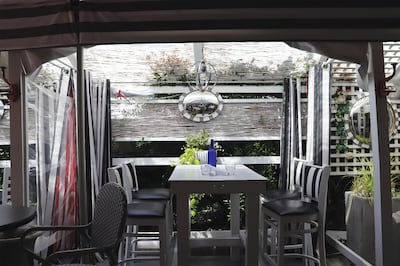One of the few good things to come out of the COVID-19 pandemic was more outdoor dining. Overnight, Portland restaurateurs erected wooden “dining sheds” on sidewalks and streets, equipping them with heaters, string lights and carpeting. A few became canvases for creative expression: Phuket Cafe’s owners in Slabtown fashioned theirs to look like a Thai train car.
Now, some of these beloved structures are vanishing, and not by choice. After encouraging their construction with easy permits and cash from the American Rescue Plan, the city of Portland wants a number of elaborate sheds gone because they block sidewalks and pose fire hazards. The federal money ran out at the end of last year, and the Portland Bureau of Transportation, which oversees public right of way, started issuing fines for noncompliance.
The move has given affected restaurant owners whiplash. Among them is Vanessa Preston, owner of Cafe Nell. Few proprietors bet on alfresco dining like Preston did. Her shed is more of an atrium, overhanging a quarter block on Northwest 20th Avenue, with fans, chandeliers, planters and a red carpet (now gone) on the sidewalk for passersby. She also erected a multipeaked tent on her parking lot. The cost: about $2 million.
Some of that money went to permits. Preston got a noise-variance permit and secured right of way to put tables along the sidewalk. After three years of appeals, she won a “nonconforming expansion” permit to offer dining in her parking lot. The investment paid off. She has more customers—and more employees—than she did before the pandemic.
But in June, PBOT sent Preston a notice of civil penalty, requiring her to take down the roof over the sidewalk, move the dining platform back from the intersection of 20th and Kearney Street, remove bolts affixed to the sidewalk, adjust planter box height, and take out a step that PBOT says makes the sidewalk unsafe.
Preston isn’t going quietly into her kitchen. She hired Julie Parrish, a former Republican state lawmaker with a penchant for fighting the system. Preston and Parrish say PBOT approved Cafe Nell’s outdoor improvements either “expressly, tacitly, or by waiver.” In a letter to the city, the pair point out that the street platform is in fact 10 feet back from what city code defines as an intersection. Preston had already moved it in 2024 at the city’s request.
Preston and other proprietors acknowledge that safety comes first, but things that were legal and encouraged before are verboten now. Penalty notices arrive for sheds that passed muster in years past and for issues raised by the city that owners already spent money to resolve.
The crackdown is confusing, restaurant owners say, because so many different city agencies regulate street-side dining. PBOT controls streets and sidewalks. Portland Fire & Rescue enforces safety for tents and canopies. Portland Permitting & Development controls structures attached to private property, such as parking lots.
“You don’t open a restaurant to fight bureaucracy,” Preston says. “You do it to serve people. Five years without incident is not something that needs to be reprimanded.”
City transportation officials say Preston and other businesses received plenty of warning as the rules changed—and that some stricter boundaries on an ad hoc program should be expected as the health emergency ebbs.
Both PBOT and restaurateurs say they consider outdoor seating a useful addition to the streetscape. Where they disagree, fiercely, is over the question of whether a return to something like pre-pandemic rulemaking is warranted, given how many of the crises of 2020 still haunt the hospitality industry.
Alex Kurnellas, owner of the Imperial Bottle Shop & Taproom on Southeast Division Street, says Portland Fire & Rescue warned him of code violations on Imperial’s outdoor seating in April. He sought justification for them soon after and plunged himself into a period of “limbo” as the fire bureau and PBOT struggled to determine which had jurisdiction.
In the end, he had to remove his shed, cutting down on family-friendly seating. Crime and blight, in the meantime, have helped push foot traffic to a record low, he says. Imperial’s July sales were down by 50% from 2024, and with a full view of Division out of his floor-to-ceiling windows, Kurnellas sees fewer pedestrians than he once did.
“In our 12 years of operation, I’ve never seen anything like this,” he said.
COVID-19 was tailor-made to crush restaurants. People gather to talk and laugh in close quarters, spewing whatever bugs they carry. When it became clear that the virus didn’t spread as well outdoors, owners saw a lifeline and grabbed it: outdoor dining.

The city fostered the solution. PBOT rolled out the Healthy Business Program, funded by Portland’s $208 million allocation from the American Rescue Plan Act of 2021. PBOT started taking applications in March 2022 and eventually issued over 800 permits for dining sheds, using the federal money to determine locations and keep sheds safe with traffic control measures.
Years later, as cities nationwide reckoned with sheds erected during a period of unbridled permit issuance, Portland sought a sturdier solution. With approval from the City Council, PBOT started the Outdoor Dining Program in January 2024. Along with providing more federally funded grants—up to $2,500 to 120 eligible businesses—the new program put into place new rules.
In the fall, roughly a year after the rules changed, PBOT started issuing fines and penalties.
The Outdoor Dining Program is still going, albeit without the federal cash, which ran out. PBOT spokeswoman Hannah Schafer says it has “provided a clear and supportive framework for businesses to maintain and create accessible and safe spaces in the public right of way” and that “the majority of applicants have successfully aligned with the program’s guidelines.”
Oregon Restaurant and Lodging Association spokesman Greg Astley tells WW the association is working with the city to develop a plan to make sure that information is accurate and clear.
Clarity can’t come soon enough for Preston at Cafe Nell and others. Atop the PBOT violations for her sidewalk atrium, Preston says she got a notice from Portland Permitting & Development saying that her parking lot-turned-dining room violated her nonconforming use permit. PP&D wants her to build an entirely new structure by 2029 and modify the existing one in the interim. In January 2025, it denied an extension of the building code appeal that allowed continued use of her structure.
The city says it has bent over backward to help. Deputy city administrator Donnie Oliveira met with Cafe Nell “representatives” to talk about improving the property, according to a June 23 letter to Preston from PP&D supervisor Michael Liefeld. Among the options was for Cafe Nell to buy the land under the tents, which it leases from a third party.
“Unfortunately, nothing has been submitted to the city to show progress on this front,” Liefeld wrote.
Parrish, Preston’s attorney, says it’s absurd to make serving food along the sidewalk (PBOT’s domain) and in a parking lot (PP&D’s jurisdiction) two separate violations.
“One hand is not talking to the other,” she says.
Preston and Parrish are still working to resolve matters with PBOT and are seeking a variance to keep the cafe’s structures. In the meantime, Cafe Nell could face fines of $899 a month for the PP&D violations alone. Preston says current economic conditions do not support construction of a new structure.
A few blocks east, Ramzy Hattar, owner of the River Pig Saloon on Northwest 13th Avenue, says the city didn’t give him enough time to remove his dining shed, a covered patio regulated under street plaza rules (not the outdoor dining code). He had to get quotes for the job and hire a contractor, and only then could get going. The structure came down in June, but the restaurant now has an outstanding balance of roughly $35,000 in fees.
“It’s obvious that the people that work in the city of Portland don’t understand how business works, and especially how construction works and how contractors work,” he says.
Even more galling, Hattar says: Last year, the city waived code restrictions and allowed food trucks to operate on nearby sidewalks, hurting his business.
Schafer, the PBOT spokeswoman, says fines are a last resort.
“We truly make every effort to work with businesses who wish to cooperate,” she said in a statement. “It’s very common for us to grant extensions when necessary. Our goal is achieving compliance rather than being punitive wherever possible.”
Preston, Cafe Nell’s owner, intends to keep up the fight. But if she is forced to deconstruct her additions, she’ll still take pride in what she did to give her customers so many safe nights out during the pandemic, and pleasant outdoor seating thereafter.
“I did for my community what few others did,” Preston says. “I’m proud of that.”

